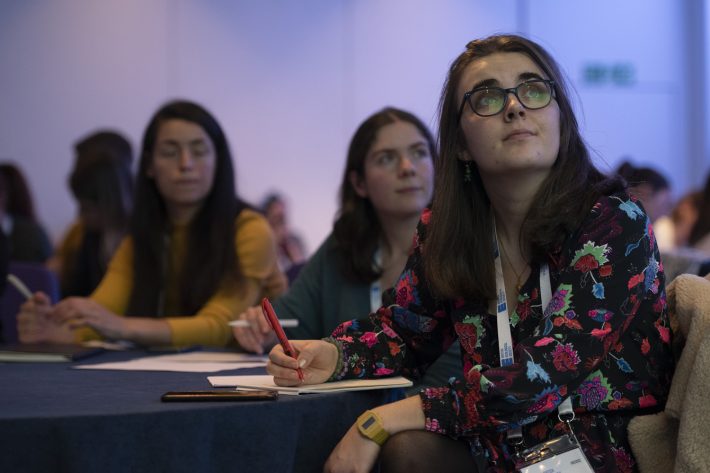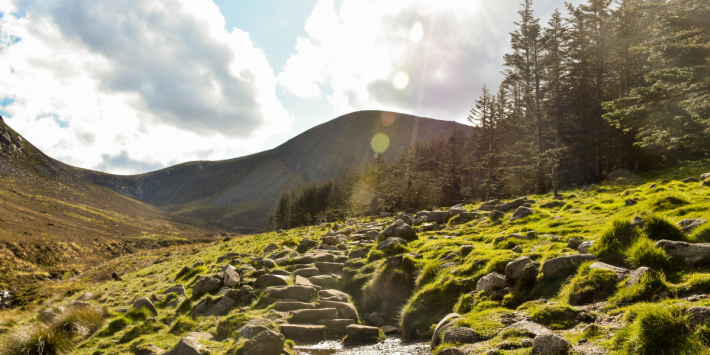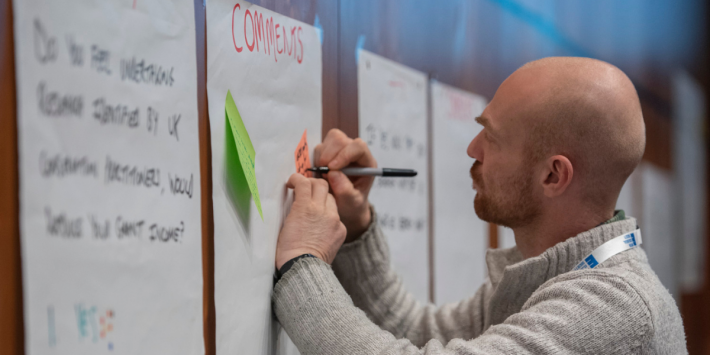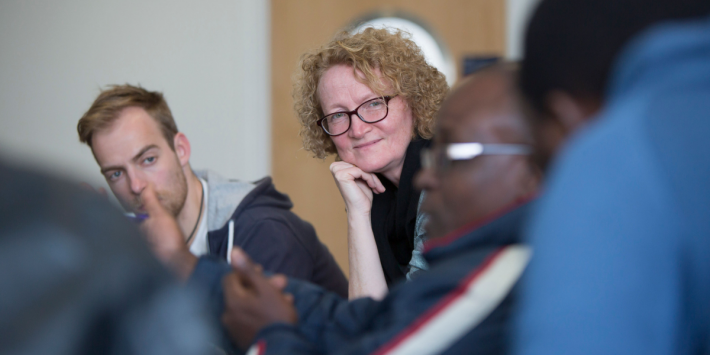Workshops
Find out more about the workshops on offer at BES2023!

We offer a range of workshops at our Annual Meeting, catering for both in-person and virtual delegates
- REGISTRATION CLOSED – Online pre-conference Early Careers Day during the week of 4 – 8 December – in-person and virtual delegates
- REGISTRATION CLOSED – Ticketed longer (up to 4 hours) pre-conference workshops and debate – in-person delegates only
- 1-hour lunchtime workshops on Wednesday 13 and Thursday 14 December – in-person delegates only
Online pre-conference Early Careers Day (Virtual, 6 December)
Registration is now closed for the online pre-conference Early Careers Day. Those who have booked will be sent a zoom link to join us for the workshop from 13:00-17:00 (GMT), Wednesday 6 December. A full agenda is available below, allowing you to choose the sessions you’re interested in.

Join us for a series of talks and workshops on key career development topics including skills workshops and talks useful to anyone starting their career journey in the ecological sector. The Early Careers Day will cover topics such as:
- Careers Outside of Academia panel
- Tips on Handling Imposter Syndrome and Networking
- Getting Published – BES Publications Team, with support from The Royal Society
- Graphic Design – BES Publications Team
- Grants Writing – BES Grants Team
- Overview of the BES conference in Belfast
Ticketed pre-conference workshops and policy debate (In-person, 11-12 December)
Encouraging Hope and Urgency: Navigating the Biodiversity and Climate Crisis (Policy debate – Monday 11 December)

Join us for an inspiring event that explores the pressing issues of biodiversity and climate crisis on the island of Ireland. This in-person gathering will be chaired by Louise Cullen (BBC NI Environment Correspondent) and will take place on Monday 11 December at the Grand Opera House in Belfast.
We will be hearing from Professor Peter Thorne (Maynooth University) , Professor John Barry (Queen’s University Belfast), Professor Yvonne Buckley (Trinity College Dublin), Jonathan Bell (RSPB NI) and Annika Clements (DAERA).
During this event, we will get into the challenges our planet and the island of Ireland faces and the urgent actions needed to preserve biodiversity and combat climate change. Renowned experts will share their insights and experiences. Through engaging presentations and thought-provoking discussions we aim to encourage hope and action.
The event is open to all. Registration via Eventbrite has now closed.
Our longer pre-conference workshops allow more time for you to gain new skills to benefit your work and dive deeper into the topic.
Registration for pre-conference workshops has now closed.

Exploring disciplinary borderlands: What can ecologists learn from the arts, humanities, and social sciences?
Organisers: Ash Brockwell, The London Interdisciplinary School (UK); Lara Kinneir, The London Interdisciplinary School (UK)
This workshop showcases a problem-centred approach to interdisciplinary education pioneered by the London Interdisciplinary School. Facilitators will offer an interactive learning session on biodiversity loss in the UK, sharing and integrating perspectives from a range of disciplines (theology, technocultural studies, architecture, anthropology, politics, and contemporary art) alongside ecology.
Coding with Chat-GPT and other large language models: Promises and pitfalls – SOLD OUT
Organisers: Aaron M. Ellison, Harvard University (USA); Adam T. Clark, Karl-Franzens-Universität Graz (Germany)
Writing clean and efficient code is a crucial scientific skill. AI platforms such as Chat-GPT and other large language models (LLMs) are rapidly becoming widely available, and can be used to teach coding and to write, explain, and debug moderately complex computer code. The workshop introduces participants to LLMs and explores the pros and cons of these emerging tools.
An introduction to close range LiDAR for forest ecology
Organiser: Emily Lines, 3DForEcoTech and Cambridge University (UK); Martin Mokroš 3DForEcoTech and University College London (UK); and Kate Hand, Forest Ecology SIG and Forest Research (UK)
Laser scanning is an exciting and rapidly expanding field, but it can be inaccessible to new users. This workshop will provide an introduction to close-range LiDAR scanning, including an overview of its potential applications and data collection methods, with a focus on getting hands on with processing 3D data.
Remote sensing for ecology: From gathering data with field spectroscopy to image classification
Organisers: Robbie Ramsay, NERC Field Spectroscopy Facility (UK); Alex Merrington, NERC Field Spectroscopy Facility (UK)
This workshop will equip participants with skills and knowledge in the fundamentals of remote sensing for ecology. Facilitators will guide participants through acquisition of data using field spectroscopy to using their ground-based data in Python and ESA SNAP to aid in UAV, airborne or satellite image classification.
On behalf of the workshop organisers, we would like to thank Spectra Vista Corporation for their support of this workshop.
Lunchtime workshops (In-person, 13 and 14 December)
Lunchtime workshops are shorter sessions taking place during the main conference programme and provide a chance to meet other delegates, gain new skills, and relax in between attending the busy sessions throughout the day. You do not need to register for these workshops, just show up on the day!
Please note that these workshops are only available in-person.

Citizen science surgery: Essential for impactful data collection and engagement
Organisers: Daniel Hayhow, Earthwatch Europe (UK); Claire Narraway, Earthwatch Europe (UK)
Citizen science (CS) is well used in ecological research. However, whilst it may seem intuitive, there are challenges and considerations to setting up successful CS projects which can vary greatly between different projects. This hands-on interactive workshop will explore tools and best practice approaches used by established citizen science projects as well as address questions and experiences raised by participants.
Who cares? Maximising the policy & practical impact of your research
Organisers: Harriet Downey, Woodland Trust (UK); Nick Phillips, Woodland Trust (UK); India Stephenson, Policy Officer, BES (UK)
Engaging with policy and practice to maximise research impact and affect change poses a challenge to many academic researchers. Using the experience and knowledge of the Woodland Trust and BES Policy Team, this session will equip participants with skills to navigate these spaces more effectively.
Simple ways to increase inclusivity by reducing student apprehension about new teaching situations
Organisers: Ashley Le Vin, University of Glasgow (UK); Emma Bailey, University of Glasgow (UK)
Universities are increasingly trying to improve inclusivity, to support neurodivergent students and the increasing number of students suffering poor mental health, so that all students will have the ability to access and participate in learning and reach their academic potential. This workshop aims to create resources promoting inclusivity.”
Workshop on nature writing in ecology: Poetry and essay
Organiser: Charlotte Ndiribe, University of Lagos (Nigeria)
Discover creative and engaging ways to communicate your science to a wider audience using nature writing. During this interactive lunchtime workshop, you’ll explore how nature writing has been used as a public engagement tool, learn how to declutter ecological terminology and be motivated to try out your own piece of creative writing to take home.
Storytelling for ecological justice across planetary boundaries
Organisers: Erinma Ochu, UWE (UK); Joyce Ternenge, University of Reading (UK); Matt Burrows, University of Reading (UK)
Join storytellers and ecologists from BLAST Fest and Earthwatch’s early-career science camp to learn how to use stories to make connections across planetary, ecological and cultural boundaries to enrich career paths, research culture and taking action in our workplaces and communities. Gain tools, stories and connections beyond the session.
Supported by UWE Bristol and University of Reading as part of the Engaging Environments initiative funded by UKRI-NERC.
A guide to better science: Ensuring safe inclusive field work
Organiser: Karen Devine, Director of Communities and Inclusion, BES (UK)
This workshop will explore what practical steps we need to take to ensure that everyone can participate in or complete fieldwork that is safe and inclusive through sharing best practice on how to make changes at the institutional level and how programme and project design impacts the budgets for fieldwork, and the importance of challenging our own perceptions of the barriers that are encountered.
How to make your research reproducible
Organisers: Andrew Hector, University of Oxford (UK); Yvonne Buckley, Trinity College Dublin (Ireland); Rowena Gordon, Managing Editor, BES (UK)
This workshop will cover the importance of reproducible research and how to use R markdown and other tools to embed code into user-friendly documents to enable this. Attendees will leave with a greater understanding of the importance of reproducible research and how to ensure your research is futureproofed.
To get the most out of this workshop, bring a laptop with R Studio downloaded, plus an R script if you have one. If you don’t have these, don’t worry, there is still plenty to learn!
Teaching ecology in a cost of living crisis
Organisers: Nicholas Worsfold, Brunel University (UK); Alice Mauchline, University of Reading (UK); Julia Cooke, Open University (UK)
In a cost-of-living crisis, how can we keep ecology inclusive? This workshop will explore participants’ experiences of how the cost-of-living crisis is affecting their teaching and learning in ecology and will identify and share solutions and good practice.
Co-designed projects in ecological research and practice: Creating and navigating successful opportunities
Organisers: Marc Cadotte, University of Toronto (Canada); Holly Jones, Northern Illinois University (USA); Mark O’Connell, University of Gloucestershire (UK); Cate Macinnis-Ng, University of Aukland (New Zealand)
Coordinators: Minhyuk Seo & Lydia Groves, BES (UK)
Co-designed projects are planned and executed in cooperation between conservation or management practitioners and academic researchers to achieve real-world impact. Despite the opportunities and success of such projects, many ecologists may be unsure as to how best to approach, create and maintain them. This interactive workshop will bring together practitioners and researchers who will share their experiences to help facilitate and encourage best practices for successful co-designed science and outcomes.
Please submit a question in advance if you would like it discussed at the workshop and consider how your project can be designed using this worksheet.
Equitable international fieldwork: What does it look like and how do we achieve it?
Organisers: Lydia Cole, Chair of the Conservation Ecology SIG, University of St Andrews (UK); Karen Devine, Director of Communities and Inclusion, BES (UK)
This joint workshop between the BES and the Conservation Ecology Special Interest Group will define what equitable research is in relation to international collaborations, discuss common challenges to achieving equitable international research, and focus on how individuals can identify and implement solutions for addressing those challenges.
Synthesis grants writing workshop
Organiser: Dylan Byrne, Grants and Community Engagement Officer, BES (UK), Dr. Mark Emmerson, Vice President of the BES and Chair of the BES Grants Committee; Professor of Biodiversity, Queen’s University Belfast, Dr Isabel Alonso, principal specialist in synthesis research, Natural England
The BES has a number of new larger value grants including Synthesis grants. If you are a senior ecologist and you mentor early career ecologists you are encouraged to come along with the ecologists you mentor to learn about the purpose of synthesis grants and how to write an application.
A research career vs campaigning for change – a false dichotomy?
Organisers: Hazel Norman, Chief Executive, BES (UK); Kristiina Visakorpi, NTNU (Norway); James Bullock, CEH (UK)
How can ecologists balance a career based on evidence and impartiality with environmental activism? The pace and scale of change in nature, so well understood by ecologists, calls for a significant shift in policy and strong political leadership. Ecologists want to be advocates for these changes but also want policy makers to value their unbiased views on data and evidence. This workshop will explore how to square that circle.
Like what we stand for?
Support our mission and help develop the next generation of ecologists by donating to the British Ecological Society.